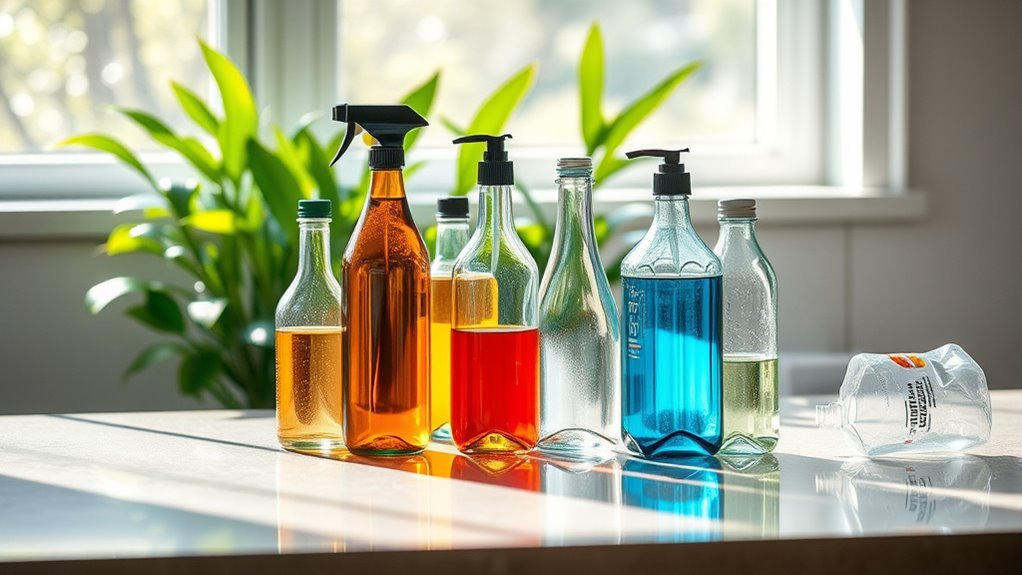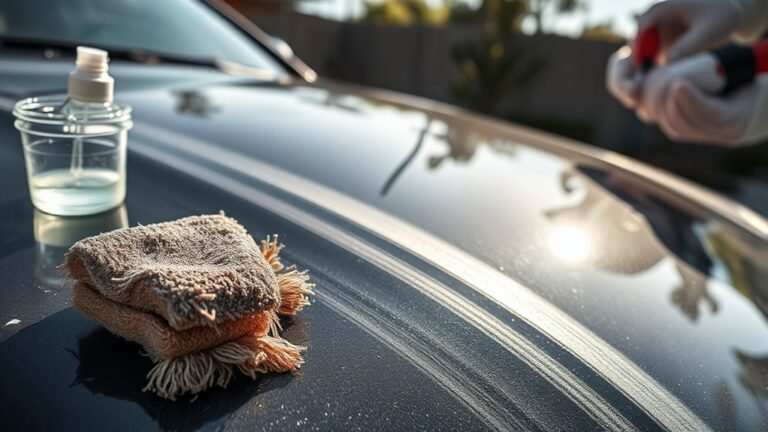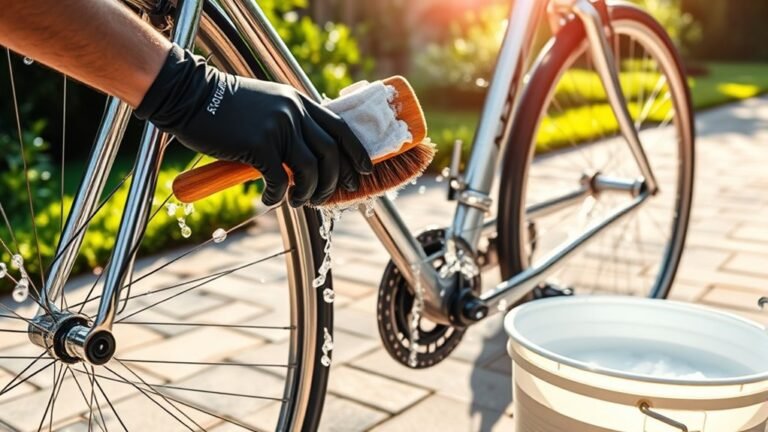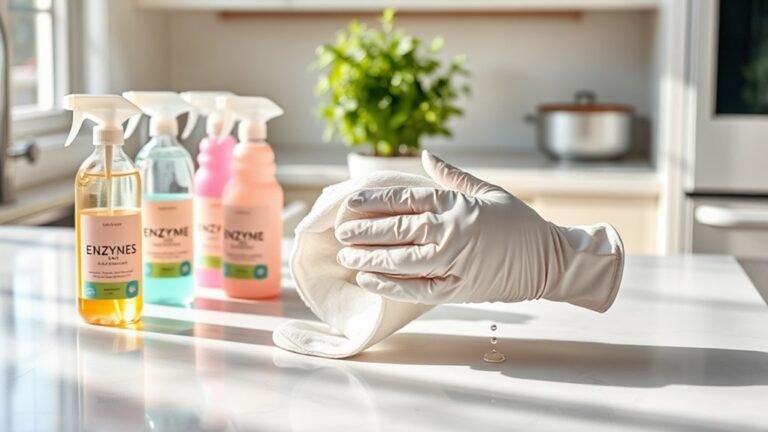The Environmental Impact of Common Cleaning Products
Every time you use common cleaning products, you’re adding harmful chemicals to the environment. These toxins pollute water, harming aquatic life and disrupting ecosystems. Indoors, they release volatile compounds that degrade air quality, impacting your health. Wildlife and soil suffer from chemical runoff, causing broader ecosystem damage. But by choosing eco-friendly alternatives and natural ingredients, you can protect both your home and the planet. There’s a lot more to discover about making safer, greener choices.
Harmful Chemicals in Cleaning Products

Although cleaning products are designed to make your home spotless, many contain harmful chemicals that can damage the environment. When you use these products, you’re exposing yourself and your surroundings to toxic ingredients that don’t just disappear after cleaning. Chemical exposure from everyday cleaners can linger in the air and on surfaces, affecting your health and the freedom to live in a safe space. Choosing products with fewer or no toxic ingredients lets you protect yourself without giving up the power to keep your home clean. It’s about reclaiming control—avoiding hidden dangers while still enjoying a fresh, safe environment. By being mindful of what’s in your cleaning products, you take a stand for your health and the planet’s well-being.
Effects on Water Quality and Aquatic Life
The chemicals you bring into your home don’t just stay there—they often end up in our waterways, affecting water quality and aquatic ecosystems. When cleaning products enter water systems, they contribute to water contamination, disrupting aquatic life by increasing aquatic toxicity. This can harm fish, plants, and other organisms, limiting the freedom of these ecosystems to thrive.
| Impact Area | Effect on Aquatic Life |
|---|---|
| Water Contamination | Introduces harmful chemicals |
| Aquatic Toxicity | Causes illness or death in species |
| Ecosystem Disruption | Alters food chains and habitats |
Air Pollution and Indoor Air Quality Concerns

When you use cleaning products indoors, you might not realize they release volatile organic compounds (VOCs) and other pollutants into the air. These indoor pollutants can linger, reducing the air quality in your home and potentially causing headaches, dizziness, or respiratory issues. Since you value freedom, it’s important to choose products that don’t trap you in a cycle of exposure to harmful chemicals. VOCs evaporate quickly but contribute greatly to indoor air pollution, limiting your ability to breathe freely. Opting for natural or low-VOC cleaning alternatives lets you maintain a clean environment without sacrificing the freedom to enjoy fresh, healthy air. Taking control over what you bring inside means you’re protecting your personal space from invisible pollutants.
Impact on Wildlife and Ecosystems
Because cleaning products often contain harmful chemicals, they can have serious effects on wildlife and ecosystems. When these substances enter waterways through chemical runoff, they disrupt delicate aquatic environments and threaten species survival. You might not realize how your choices contribute to habitat destruction, but each use can impact biodiversity. Here’s what you should know:
- Chemical runoff contaminates water, poisoning fish and amphibians.
- Toxic substances accumulate in soil, harming plants and insects.
- Habitat destruction occurs as ecosystems become unbalanced.
- Wildlife faces reproductive and developmental problems from pollutants.
Sustainable Alternatives and Eco-Friendly Practices

Recognizing how cleaning products harm wildlife and ecosystems can motivate you to choose greener options. You don’t have to sacrifice cleanliness for freedom from environmental harm. Opt for biodegradable solutions that break down naturally, minimizing pollution and protecting aquatic life. Look for products made with natural ingredients like vinegar, baking soda, and essential oils—they’re effective, safe, and gentle on the planet. Making your own cleaners at home lets you control what goes into them, reducing your chemical footprint. By embracing these eco-friendly practices, you free yourself from harsh toxins and support a healthier Earth. It’s about choosing power in your hands and peace of mind, knowing your cleaning habits align with preserving the world you love. Sustainable alternatives let you clean responsibly without compromising your lifestyle.
Frequently Asked Questions
How Do Cleaning Product Packaging Materials Affect the Environment?
When you choose cleaning products, the packaging materials matter a lot for the environment. If they’re made from biodegradable materials, they break down naturally, reducing waste. On the other hand, if the packaging’s recyclable, participating in recycling initiatives helps keep plastics and metals out of landfills. By being mindful of what you buy, you’re freeing yourself from contributing to pollution and supporting a cleaner, greener planet.
Are There Regulations Limiting Toxic Ingredients in Cleaning Products?
Yes, there are regulatory standards in place that limit toxic ingredients in cleaning products to protect your health and the environment. However, these rules can vary widely depending on where you live, so it’s important you stay informed. Ingredient transparency is becoming more common, letting you choose products that align with your values and freedom to make safe, eco-friendly decisions without feeling restricted by confusing labels or hidden chemicals.
What Is the Carbon Footprint of Manufacturing Cleaning Products?
You might not realize it, but the carbon footprint of manufacturing cleaning products can be quite significant. The manufacturing processes often involve energy-intensive steps that release carbon emissions into the atmosphere. If you want to reduce your impact, choosing products made with cleaner, more efficient methods can help. By being aware of these factors, you’ll have the freedom to make choices that align with your values and protect the planet.
How Can Consumers Properly Dispose of Unused Cleaning Products?
What’s the best way to ditch unused cleaning products without harming the planet? You’ll want to check if your community offers recycling programs or hazardous waste collection days. Don’t just toss them in the trash—that can pollute soil and water. Instead, safely drop off these items at designated centers. By doing this, you’re protecting the environment and keeping your freedom to enjoy a cleaner, greener world.
Do Cleaning Products Impact Soil Health When Washed Down Drains?
When you wash cleaning products down drains, they often end up as chemical runoff that seeps into the soil. This runoff can harm soil microorganisms, which are essential for keeping soil healthy and fertile. Without these tiny helpers, soil quality declines, affecting plant growth and ecosystems. So, if you want to keep your environment thriving and free, it’s smart to choose eco-friendly products and dispose of them properly to protect soil health.






